iGUESS-MED (Innovative Greenhouse Support System in the Mediterranean Region: efficient fertigation and pest management through IoT based climate control) is a project selected and financed by PRIMA (Partnership for Research and Innovation in the Mediterranean Area Implementation Structure), which started in April 2020 with a duration of 4 years, in which nine partners including public and private bodies from 4 countries in the Mediterranean basin (Italy, Spain, Turkey, and Tunisia) take part. Italian company EVJA is one of the partners.
Coordinator and scientific project head Alejandra Navarro Garcia (CREA) specified that the general objective of the iGUESS-MED project - which the Consiglio per la Ricerca in agricoltura e l'analisi dell'Economia Agraria (CREA), the University of Pisa (UNIPI), BIOPLANET, the University of Almeria (UAL), the CAJAMAR foundation, Grupo La Caña, Centro di Ricerca Regionale in Orticoltura e Agricoltura Biologica (CRRHAB) and the University of Akdeniz are part of - is to support the transition towards innovative, sustainable and competitive greenhouses in the Mediterranean by developing and validating a pioneering decision support system (DSS) for the Mediterranean basin.
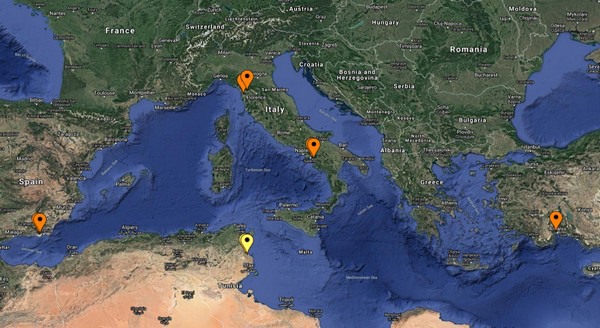
iGUESS-MED facilities in the Mediterranean basin
Antonio Affinito, engineer at EVJA and technical manager at iGUESS-MED, explained that "the DSS will supply information on the evolution of many biological and physical processes occurring in greenhouses such as the development of parasites and diseases, plant growth, evapotranspiration, soil water content, nutritional status, and the weather. All processes can be easily controlled by growers thanks to a specific WebApp for tablets and smartphones." Processes will be compared with values of reference to warn growers in real-time about the need for corrective measures (irrigation, addition of nutrients, dehumidification, biological control).
"Over 70% of growers own a smartphone, and the agricultural sector has been positively influenced by Wireless Sensor Network (WSN) technologies, which are becoming increasingly popular thanks to the technological development of Internet of Things (IoT). Employing this DSS will reduce the use of pesticides and fungicides, freshwater, and leachate," explained Affinito.
"The new iGUESS-MED will be based on OPI, EVJA's state-of-the-art Decisional Support System that integrates modern Internet of Things, Big Data, and Artificial Intelligence technologies in a single cloud platform. The platform is optimized to process the data acquired by control units (Sensor Nodes) installed in the fields and develops advanced agro-climatic algorithms and innovative prediction models calibrated for specific crops."
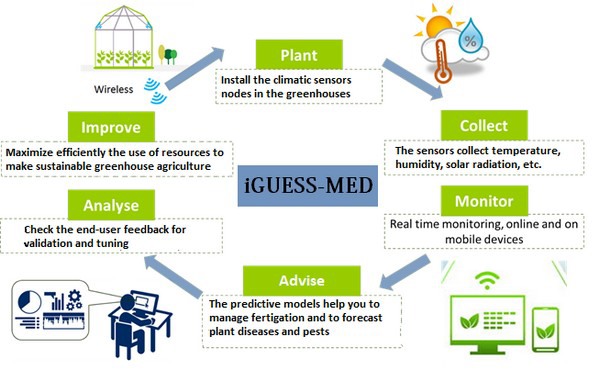
Work scheme of DSS iGUESS-MED
EVJA's OPI control units are rugged and waterproof electronic devices that can withstand the hostile conditions found in agricultural environments and are completely independent of an energetic and internet connectivity point of view. These characteristics enable the installation of the system in all types of environments.
OPI control units are therefore optimized to manage and transmit agro-climatic data acquired in the fields by the sensors installed in the immediate proximity of the crop, which monitor essential factors such as air humidity and temperature, solar radiation, leaf wetting, and soil water content at different depths in real-time.
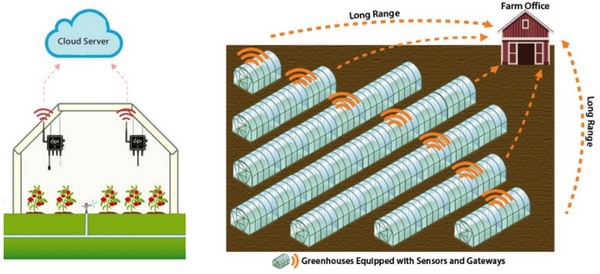
The data collected are sent to the remote central system
All parameters acquired are georeferenced thanks to the GPS technology integrated into the devices and are therefore automatically linked with a specific geographic position. Ongoing georeferenced monitoring enables the DSS to supply further information such as weather forecast, sunrise and sunset, and lunar phase, always updated with the geographic position.
The software platform developed by EVJA is a cloud WebApp, accessible from any computer or smartphone with an Internet connection. The data collected is processed by advanced agro-climatic algorithms and predictive models of specific phytopathology and diseases that can affect tomato crops, showing users various parameters related to the state of the crop.
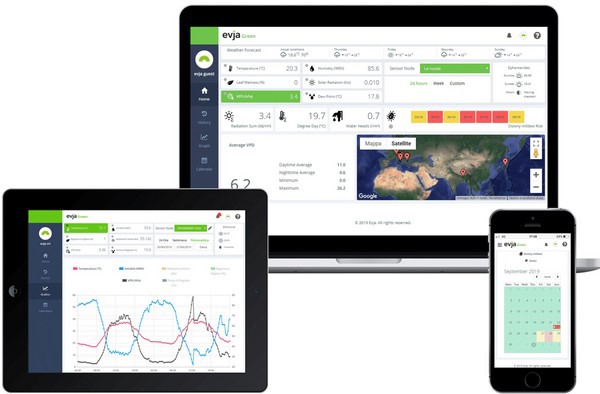
OPI- iGUESS-MED control panel
The iGUESS-MED DSS is a smart agro-climatic analysis tool, useful to make the best decisions during the entire crop management phase (e.g., planning, sowing) when it comes to field operations (field preparation, sowing, irrigation) and crop defense and nutrition (optimal periods for specific treatments or fertilization).
Professors Marisa Gallardo (UAL) and Luca Incrocci (UNIPI) are the managers and creators of the models used in this project for DSS development for plant growth, evotranspiration, and nutritional condition. "To optimize water requirements and irrigation with both conventional and low-quality (saline) water, as well as for fertigation strategies, simple models are being developed and tested that can provide recommendations. The use of biomass growth models based on growing degree-day and/or light interception will enable to simulate the removal of macronutrients (N, P, K, Ca, Mg e S) from the nutrient solution of both soil-less and traditional crops."
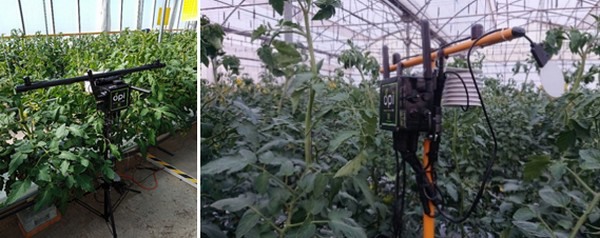
Climatic sensors in a soil-less tomato crop in Pontecagnano, Italy (left) and in a traditional crop in Almeria, Spain (right)
"Results obtained so far are highly promising and will become available in less than a year. The evotranspiration models that use the climatic parameters detected by OPI units, together with data regarding the crop, have been validated with sap flow sensors to estimate plant transpiration and with lysimeters inside greenhouses to calculate evaporation," conclude Gallardo and Incrocci.

Left: installation of sap flow sensors to estimate transpiration in a soil-less crop in Pescia, Italy. Centre: lysimeters in a traditional tomato crop in Antalya (Turkey). Right: lysimeters in a traditional tomato crop in Almeria (Spain)
The main stakeholders for iGUESS-MED are the growers and agricultural actors. They need to improve the efficiency of resources and productivity but must also keep product quality high and respect the environment. They will be involved in the project to verify the efficiency of the DSS in various demo companies in the various Mediterranean countries involved in the project (Italy, Spain, Tunisia, and Turkey).
